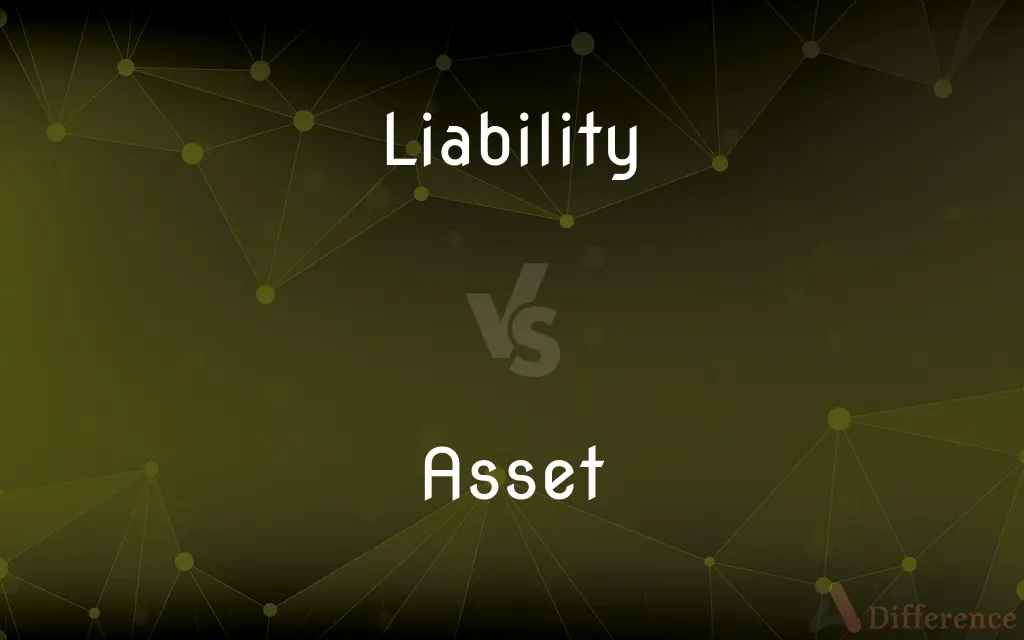Liability vs. Asset — What's the Difference?
Edited by Tayyaba Rehman — By Fiza Rafique — Published on October 11, 2023
Liability represents a company's financial debt or obligations, while an asset is a resource with economic value expected to provide future benefit.

Difference Between Liability and Asset
Table of Contents
ADVERTISEMENT
Key Differences
Liabilities and assets are foundational terms in accounting and finance, each holding opposing implications. A liability refers to an obligation, typically of financial nature, that arises from past transactions or events. They represent what a person or business owes. For instance, bank loans and unpaid bills are common forms of liabilities.
Conversely, an asset is something valuable that an individual, corporation, or country owns or controls with the expectation that it will provide future benefit. Assets can be both tangible, like buildings and machinery, and intangible, such as patents or goodwill. They are resources that have economic value and can be converted into cash or used to produce goods and services.
While liabilities can be seen as financial burdens, they are not necessarily negative in the context of business. For example, taking on a liability in the form of a loan can lead to acquiring an asset, such as a property or equipment, which might further the growth and profitability of a business.
Assets, on the other hand, contribute positively to the net worth of an individual or entity. When assessing the financial health of a company, it's essential to look at the balance between its assets and liabilities. If assets exceed liabilities, the entity is considered financially healthy, and vice versa.
Comparison Chart
Definition
A financial obligation or debt one owes.
A valuable resource or item one owns.
ADVERTISEMENT
Nature
Represents what is owed.
Represents ownership and value.
Impact on Net Worth
Decreases net worth.
Increases net worth.
Types
Can be long-term (e.g., mortgage) or short-term (e.g., monthly bills).
Can be tangible (e.g., land) or intangible (e.g., patent).
Role in Balance Sheet
Found on the right side (creditors' claim on assets).
Found on the left side (what a company owns).
Compare with Definitions
Liability
A financial obligation or debt.
The company has a liability of $50,000 in unpaid loans.
Asset
A valuable item or property owned by a person or company.
The company's main asset is its intellectual property.
Liability
Amounts owed to creditors.
The business’s monthly utilities are considered a recurring liability.
Asset
A resource with economic value expecting to provide future benefit.
Goodwill is an intangible asset derived from a company's reputation.
Liability
Legal responsibility for one's actions or products.
Manufacturers can face liability for defective products.
Asset
Something useful or valuable.
His expertise in marketing is a significant asset to the team.
Liability
Responsibility or obligation arising from law or contract.
As a director, he has a liability to act in the company's best interest.
Asset
Properties used in the operation or investment activities of a business.
Real estate holdings are major assets in their investment portfolio.
Liability
Potential for harm or disadvantage.
His unpredictable behavior is a liability to the team.
Asset
A possession that can be turned into cash or equivalents.
The machinery, considered a fixed asset, was sold to improve cash flow.
Liability
The state of being liable.
Asset
A useful or valuable quality, person, or thing; an advantage or resource
Proved herself an asset to the company.
Liability
Something for which one is liable; an obligation, responsibility, or debt.
Asset
A valuable item that is owned.
Liability
Liabilities The financial obligations entered in the balance sheet of a business enterprise.
Asset
A spy working in their own country and controlled by a foreign power or an enemy.
Liability
Something that holds one back; a handicap.
Asset
(Accounting) The entries on a balance sheet showing all properties, both tangible and intangible, and claims against others that may be applied to cover the liabilities of a person or business. Assets can include cash, stock, inventories, property rights, and goodwill.
Liability
Likelihood.
Asset
The entire property owned by a person, especially a bankrupt, that can be used to settle debts.
Liability
An obligation, debt or responsibility owed to someone.
Asset
A thing or quality that has value, especially one that generates cash flows.
My assets consist of stocks in companies that pay a dividend, and a few apartments that pay me rental income.
Liability
(accounting) Any item recorded on the right-hand side of a balance sheet.
Asset
(accounting) Any item recorded on the left-hand side of a balance sheet.
Liability
A handicap that holds something back, a drawback, someone or something that is a burden to whoever is required to take care of them; an individual or action that exposes others to greater risk.
Asset
(software) Any component, model, process or framework of value that can be leveraged or reused.
Liability
A person on a team that is more of a hindrance than a help.
You're a bloody liability sometimes!
Asset
(espionage) An intelligence asset.
Liability
The likelihood of something happening.
Asset
A woman's breasts or buttocks or a man's genitalia.
Liability
The condition of being susceptible to something.
Asset
Any article or separable part of one's assets.
Liability
The state of being liable; as, the liability of an insurer; liability to accidents; liability to the law.
Asset
A useful or valuable quality
Liability
That which one is under obligation to pay, or for which one is liable.
Liability
The state of being legally obliged and responsible
Liability
An obligation to pay money to another party
Liability
The quality of being something that holds you back
Common Curiosities
Can a liability turn into an asset?
Indirectly, yes. For instance, a loan (liability) might fund a business expansion (asset).
How do liabilities affect a company's balance sheet?
Liabilities represent what a company owes, impacting its overall net worth on the balance sheet.
Why are assets important to businesses?
Assets contribute to a company's value, operational capabilities, and overall financial health.
What are examples of current assets?
Current assets include cash, accounts receivable, and inventory.
How do intangible assets benefit a company?
Intangible assets, like patents, can offer competitive advantages or generate revenue.
How is an asset defined?
An asset is a valuable resource or item that one owns, expected to provide future benefits.
Can an asset have a negative value?
Generally, no. However, if an asset's value decreases significantly, it might become impaired or devalued.
What is a liability?
A liability is a financial obligation or debt that one owes.
What's the difference between tangible and intangible assets?
Tangible assets are physical (like machinery), while intangible assets lack physical presence (like trademarks).
Can a liability be a positive aspect for a company?
Yes, if a liability like a loan is used effectively to grow or improve the business.
Can an individual have liabilities and assets?
Absolutely. An individual's mortgage is a liability, while their home is an asset.
What's the relationship between assets and equity?
Equity represents the residual interest in the assets after deducting liabilities.
How are assets and liabilities represented on a balance sheet?
Assets are on the left side, while liabilities (and equity) are on the right.
Is a credit card debt a liability?
Yes, credit card debt is a liability because it represents an amount owed.
Are all liabilities financial in nature?
While many are, liabilities can also refer to responsibilities or potential disadvantages.
Share Your Discovery

Previous Comparison
Neglect vs. Inattention
Next Comparison
Real Accounts vs. Nominal AccountsAuthor Spotlight
Written by
Fiza RafiqueFiza Rafique is a skilled content writer at AskDifference.com, where she meticulously refines and enhances written pieces. Drawing from her vast editorial expertise, Fiza ensures clarity, accuracy, and precision in every article. Passionate about language, she continually seeks to elevate the quality of content for readers worldwide.
Edited by
Tayyaba RehmanTayyaba Rehman is a distinguished writer, currently serving as a primary contributor to askdifference.com. As a researcher in semantics and etymology, Tayyaba's passion for the complexity of languages and their distinctions has found a perfect home on the platform. Tayyaba delves into the intricacies of language, distinguishing between commonly confused words and phrases, thereby providing clarity for readers worldwide.















































